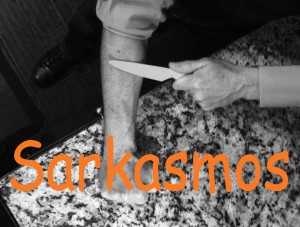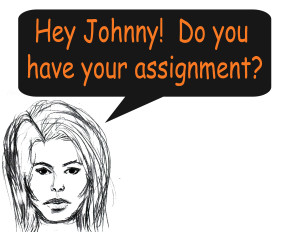The Oxford English Dictionary describes sarcasm as a form of irony that is bitter or cutting, being intended to taunt its target. According to Merriam-Webster’s Online Dictionary, sarcasm evolved from the Greek word sarkasmos, which means to tear flesh. It’s time to understand the lethal nature of this tactic.
Unfortunately, many teachers frequently use sarcasm. It’s an understandable response borne out of some type of frustration. Please don’t let it be a staple of your repertoire.
Here’s a typical scenario:
Educator: “Hey Johnny. Do you have your assignment?”
Johnny: “No! I was too busy texting my girlfriend.”
Educator: “Wow! That’s really going to prepare you to compete in the global economy.”
Everyone laughs at Johnny and his attitude. Johnny even laughs, but Johnny knows, even though he displays ambivalence, he just got dissed! He understands this is now part of his relationship with his teacher, and he will return the favor…BIG TIME! More importantly, the teacher just reinforced, to the entire class, a negative image of this student. Sadly, putting aside the arrogant exterior, Johnny’s insecurities just got a massive boost! He’s probably thinking, Gosh,maybe it’s true…I AM stupid. Or, I guess I AM irresponsible.
All the other students are now on notice. It’s clear, that in this classroom, the teacher has no problem making them look bad in front of their peers. Is this the kind of atmosphere you want to create?
Now, I don’t want to try to come off to Zen-like on this issue. I’ve taught for 30 years, and I HAVE occasionally engaged in sarcasm with my students. But I can assure you…IT NEVER ENDED WELL! The temporary high of making a witty snarky comment at some student’s expense was not worth the damage it did to that youngster, nor the negative impact on the nurturing atmosphere that I’ve always hoped to create in my classroom.
You might think I’m making too much of this, but engaging in sarcasm is a vice, and it needs to be recognized as such. Like all vices, it feels awesome at the time, but the after-effects can be unsavory. Most carbon-based lifeforms have tremendous tolerance for their own vices. I view mine as no big deal, but I’m not sure my friends and family agree. So sarcasm, if it’s used it all, must be employed sparingly, and directed toward someone who won’t take offense, or be injured by it.
If you’d like to learn more about connecting with students, check out my book “You’ve Gotta Connect”
You can also listen to me talk about connecting with students on the following podcasts:
Talks With Teachers with Brian Sztabnik http://bit.ly/1DwrNMu
Inspiring Educators with Sung Lee http://bit.ly/1yaBkpe
Cult of Pedagogy with Jennifer Gonzalez http://bit.ly/1sFSbBl
Principal Center Radio with Justin Baeder http://bit.ly/1yXcN89
All Sides on NPR’s WOSU 89.7 with Ann Fisher http://bit.ly/1wO2GDX
Middle School Matters http://bit.ly/1uO0dUh
Please visit my website https://jamesalansturtevant.com/ and follow me on Twitter @jamessturtevant


